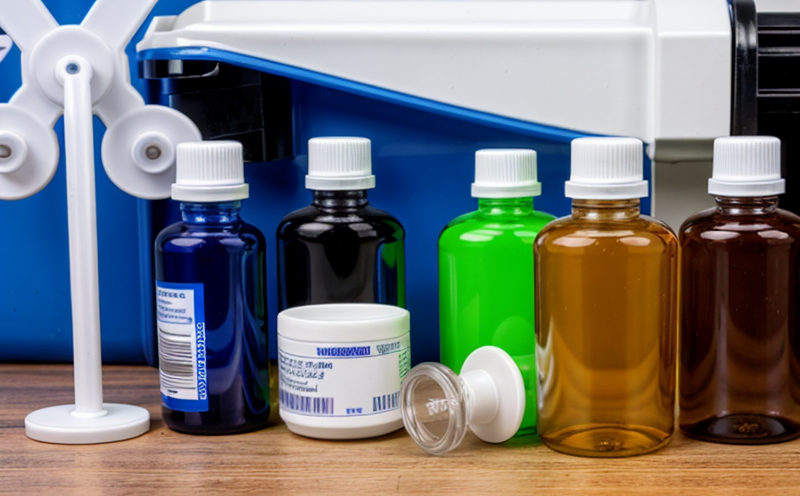ASTM D5907 Inorganic Anions in Medical Wastewater
The ASTM D5907 standard test method is an essential tool for the analysis of inorganic anions present in medical wastewaters. This service focuses on the accurate quantification and identification of these critical contaminants, which can have significant environmental impacts if not properly managed.
The primary objective of ASTM D5907 testing is to measure the concentration levels of specific inorganic anions such as chloride (Cl-), bromide (Br-), iodide (I-), nitrate (NO3-), nitrite (NO2-), phosphate (PO43-), and sulfate (SO42-) in medical waste streams. These anions, especially nitrogen species, are among the most important pollutants found in this type of wastewater.
The testing process involves several critical steps to ensure accurate results. The first step is proper sample collection and preservation to prevent any degradation or alteration of analytes before analysis. Samples must be stored at appropriate temperatures and handled with care to avoid contamination. Upon receipt, samples are analyzed using ion chromatography (IC), a highly sensitive technique capable of detecting even minute concentrations of target anions.
The results from ASTM D5907 testing provide valuable insights into the efficiency of wastewater treatment processes in medical facilities. By monitoring these parameters, healthcare providers and waste management companies can identify potential areas for improvement in their operational procedures to minimize environmental impact. This service is particularly beneficial for quality managers, compliance officers, R&D engineers, and procurement teams who need reliable data to support regulatory compliance.
Understanding the significance of inorganic anions in medical wastewaters helps stakeholders make informed decisions about waste handling practices. For instance, excessive nitrate concentrations can lead to eutrophication when discharged into natural water bodies, causing harmful algal blooms and oxygen depletion. Monitoring these parameters allows for proactive measures to be taken to mitigate such risks.
The ASTM D5907 test is widely recognized as a robust method for assessing the quality of medical waste effluents. Compliance with this standard ensures that facilities adhere to stringent environmental regulations set forth by various authorities like the EPA in the United States or similar bodies across different countries.
The process typically involves several key stages including sample preparation, extraction if necessary, injection into an ion chromatograph for separation and detection, followed by quantitative analysis using calibration curves prepared according to established guidelines. The final step is reporting results which include raw data along with calculated values for each measured anion.
| Target Anions | Units of Measurement | Typical Concentrations Range (ppm) |
|---|---|---|
| Chloride (Cl-) | Ppm | 10-200 |
| Bromide (Br-) | Ppm | <1 - 30 |
| Iodide (I-) | Ppm | <0.5 - 20 |
| Nitrate (NO3-) | Ppm | 1-1000 |
| Nitrite (NO2-) | Ppm | <0.5 - 100 |
| Phosphate (PO43-) | Ppm | <0.1 - 20 |
| Sulfate (SO42-) | Ppm | 5-800 |
The precision and accuracy of ASTM D5907 tests are paramount for ensuring reliable results. Our state-of-the-art laboratory facilities equipped with advanced instrumentation guarantee consistent performance across all samples analyzed. Regular calibration checks further enhance the reliability of our findings.
By leveraging this service, clients gain access to comprehensive data regarding their medical waste streams which enables them to implement more effective waste management strategies. This not only supports regulatory compliance but also contributes positively towards sustainable practices within healthcare settings.
Industry Applications
- Hospitals and clinics for routine monitoring of wastewater discharges.
- Pharmaceutical manufacturers ensuring adherence to environmental standards.
- Healthcare facilities implementing new treatment technologies.
- Regulatory bodies conducting audits on medical waste management practices.
The application of ASTM D5907 extends beyond just compliance; it plays a crucial role in advancing knowledge about the composition and behavior of medical wastewaters. Through continuous monitoring, stakeholders can identify emerging trends or challenges related to specific anions within these complex systems.
Eurolab Advantages
Our proficiency in ASTM D5907 testing sets us apart from other laboratories offering similar services. With years of experience and cutting-edge technology, we provide accurate, reproducible results that meet or exceed international standards.
- Comprehensive understanding of medical waste characteristics and treatment processes.
- Expertise in ion chromatography techniques tailored specifically for this type of analysis.
- State-of-the-art equipment ensuring minimal detection limits.
- Dedicated team committed to maintaining strict quality assurance protocols throughout the entire testing process.
The combination of our technical know-how and commitment to excellence ensures that every client receives high-quality service. Whether you're a healthcare provider looking to maintain compliance or an R&D engineer seeking detailed insights into your processes, Eurolab is here to assist with all your ASTM D5907 testing needs.
International Acceptance and Recognition
- ASTM D5907 has been adopted by numerous regulatory bodies worldwide including the EPA, WHO, EU Commission.
- It is referenced in multiple national standards such as ISO/TS 16348-1 and EN 12457.
- The method has gained widespread acceptance among academic institutions for research purposes.
- Many international conferences on environmental sciences feature presentations based on ASTM D5907 data.
This global recognition underscores the importance of this standard in providing consistent, reliable measurements across diverse environments and regions. By adhering to ASTM D5907 guidelines, laboratories around the world contribute towards a more harmonized approach to environmental monitoring.





